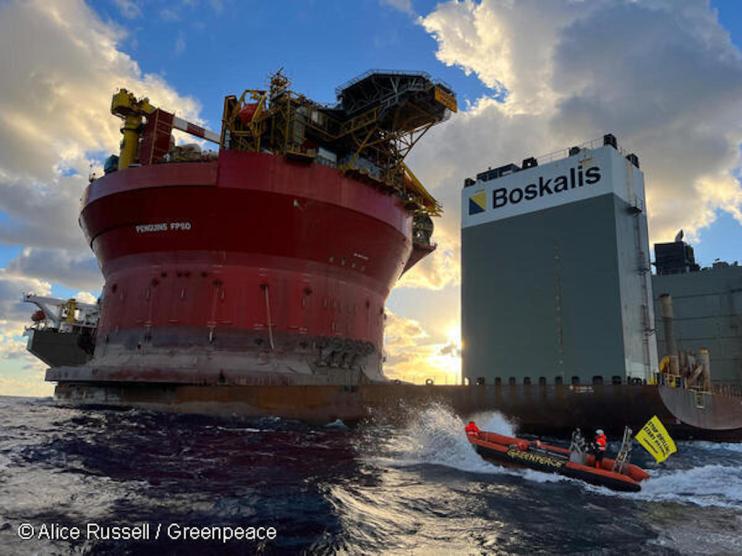Shell wins High Court injunction against Greenpeace protestors occupying oil platform in North Sea

Shell has won a bid for a new High Court injunction against Greenpeace protesters occupying an oil platform as it is transported to the North Sea.
On January 31, four protesters from the environmental campaign group boarded the White Marlin, a heavy-load ship carrying a floating oil and gas platform, as it travelled near the Canary Islands on its way to Norway.
Greenpeace claims the 34,000-tonne platform, which is being transported from China, will allow Shell to unlock eight new wells in the Penguins field in the North Sea.
Shell was granted an injunction on Friday, which included a 500-metre exclusion zone and an order that the protesters remain in contact with the ship’s captain.
However, two more demonstrators boarded the large ship on Monday using boats Greenpeace say were not covered by the previous order.
At a hearing at the High Court in London on Tuesday, Mr Justice Andrew Baker granted a second order designed to stop more people boarding, which also requires demonstrators to disembark as soon as possible after safely mooring in Norway.
James Leabeater KC, for Shell and engineering company Fluor, told the court the ship was approximately level with the Humber on Tuesday morning and is due to arrive in Haugesund, Norway, on Wednesday afternoon.
He said: “In light of the fact that Greenpeace International have not complied with at least the spirit of the order, it is time for a more wide-ranging order to be made.”
The barrister added that the companies want to prevent demonstrators from “relying on technicalities”.
In his written submissions, Mr Leabeater said: “It is not clear, as things stand, whether the order of 3 February has been breached, but it appears that Greenpeace and its activists may continue to take such actions as they can further to board the White Marlin.
“The claimants do not seek to stop Greenpeace from peacefully protesting; they merely want to try to prevent further highly dangerous actions.”
Victoria Wakefield KC, for Greenpeace, told the court that Friday’s order should not have been made.
She added that, because the ship is a Maltese vessel, the law of Malta should apply.
The barrister said in written submissions: “All of the judge’s analysis and consideration of these questions were vitiated by the non-disclosure that English law did not in fact apply… No evidence of Maltese law was presented.”
She later said the demonstrations involved Articles 10 and 11 of the European Convention on Human Rights – freedom of expression and the freedom to protest.
Ms Wakefield said in written submissions: “The activities engaged in fall squarely within Article 11.
“The question is whether the interference with those rights sought by the claimants is justified… His approach wrongly failed to engage with that core evaluative exercise.”
Mr Justice Andrew Baker said the order did not infringe the protesters’ human rights, granting the second injunction.
“I propose to only grant relief that is focused on the need for no-one else to board either the White Marlin or the (platform) itself,” he said.
The judge added that the demonstrators are putting themselves, and indirectly the crew of the ship, at risk.
“They can have as many ships as they wish following the White Marlin at a safe distance with as many banners they wish,” he said.
“It does not seem to me seriously arguable that the protective rights under Articles 10 and 11 are infringed.”
The protest came as Shell reported the highest profit in its 115-year history, with core profits rocketing to 84.3 billion US dollars (£68.1 billion) in 2022.
Press Association – Jess Glass
